高一英语外研版_必修4_module_4_great_scientists_教案 3
外研版高中英语必修四备课Module 4 Great Scientists素材传奇人物
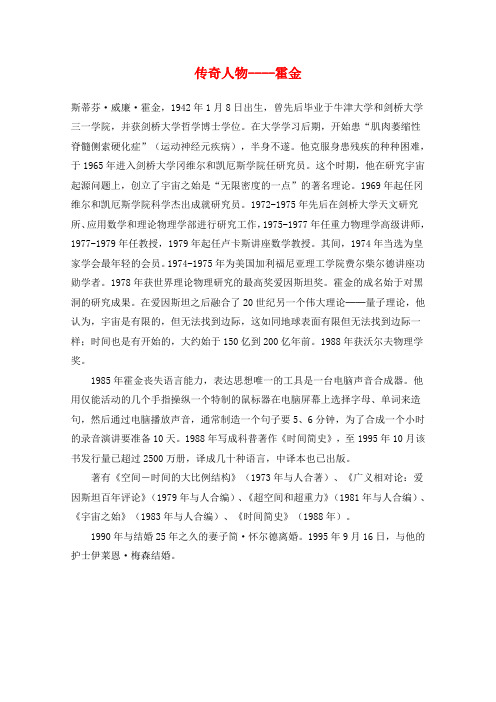
传奇人物----霍金斯蒂芬·威廉·霍金,1942年1月8日出生,曾先后毕业于牛津大学和剑桥大学三一学院,并获剑桥大学哲学博士学位。
在大学学习后期,开始患“肌肉萎缩性脊髓侧索硬化症”(运动神经元疾病),半身不遂。
他克服身患残疾的种种困难,于1965年进入剑桥大学冈维尔和凯厄斯学院任研究员。
这个时期,他在研究宇宙起源问题上,创立了宇宙之始是“无限密度的一点”的著名理论。
1969年起任冈维尔和凯厄斯学院科学杰出成就研究员。
1972-1975年先后在剑桥大学天文研究所、应用数学和理论物理学部进行研究工作,1975-1977年任重力物理学高级讲师,1977-1979年任教授,1979年起任卢卡斯讲座数学教授。
其间,1974年当选为皇家学会最年轻的会员。
1974-1975年为美国加利福尼亚理工学院费尔柴尔德讲座功勋学者。
1978年获世界理论物理研究的最高奖爱因斯坦奖。
霍金的成名始于对黑洞的研究成果。
在爱因斯坦之后融合了20世纪另一个伟大理论──量子理论,他认为,宇宙是有限的,但无法找到边际,这如同地球表面有限但无法找到边际一样;时间也是有开始的,大约始于150亿到200亿年前。
1988年获沃尔夫物理学奖。
1985年霍金丧失语言能力,表达思想唯一的工具是一台电脑声音合成器。
他用仅能活动的几个手指操纵一个特制的鼠标器在电脑屏幕上选择字母、单词来造句,然后通过电脑播放声音,通常制造一个句子要5、6分钟,为了合成一个小时的录音演讲要准备10天。
1988年写成科普著作《时间简史》,至1995年10月该书发行量已超过2500万册,译成几十种语言,中译本也已出版。
著有《空间-时间的大比例结构》(1973年与人合著)、《广义相对论:爱因斯坦百年评论》(1979年与人合编)、《超空间和超重力》(1981年与人合编)、《宇宙之始》(1983年与人合编)、《时间简史》(1988年)。
1990年与结婚25年之久的妻子简·怀尔德离婚。
外研版必修4 module4 great scientists_教案精编版
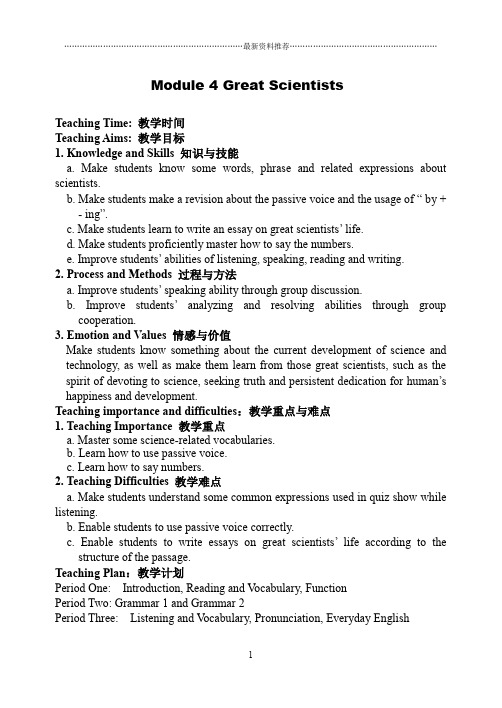
Module 4 Great ScientistsTeaching Time: 教学时间Teaching Aims: 教学目标1. Knowledge and Skills 知识与技能a. Make students know some words, phrase and related expressions about scientists.b. Make students make a revision about the passive voice and the usage of “ by +- ing”.c. Make students learn to write an essay on great scientists’ life.d. Make students proficiently master how to say the numbers.e. Improve students’ abilities of listening, speaking, reading and writing.2. Process and Methods 过程与方法a. Improve students’ speaking ability through group discussion.b. Improve students’analyzing and resolving abilities through groupcooperation.3. Emotion and Values 情感与价值Make students know something about the current development of science and technology, as well as make them learn from those great scientists, such as the spirit of devoting to science, seeking truth and persistent dedication for human’s happiness and development.Teaching importance and difficulties:教学重点与难点1. Teaching Importance 教学重点a. Master some science-related vocabularies.b. Learn how to use passive voice.c. Learn how to say numbers.2. Teaching Difficulties 教学难点a. Make students understand some common expressions used in quiz show while listening.b. Enable students to use passive voice correctly.c. Enable students to write essays on great scientists’life according to thestructure of the passage.Teaching Plan:教学计划Period One:Introduction, Reading and V ocabulary, FunctionPeriod Two: Grammar 1 and Grammar 2Period Three: Listening and V ocabulary, Pronunciation, Everyday EnglishPeriod Four: Reading and WritingPeriod Five: Cultural Corner, Module FileReadingTeaching Goals:1.To know something about great scientists, such as Qian Xuesen, Marie Curie,Archimedes, Albert Einstein and Yuan Longping;2.To learn some science-related words;3.To learn how to say numbers.Teaching Procedures:Step 1: Lead in----- IntroductionBrainstorm:Question: What great scientists do you know? ( free speaking )Make students say something about those four great scientists--- Qian Xuesen,The answers:1. zoology2. botany3. biology4. physics5. biochemistry6. chemistry7. geneticsStep 2:Reading and Vocabulary1.From the title “The Student Who Asked Questions”, guess what the passage isabout?Who is the student?2. Make students find the topic sentence of each paragraph.Para1: Yuan Longping is a leading figure in the rice-growing world.Para2: As a boy, he was called “the student who asked questions”.Para3: As a young teacher, he began experiments in crop breeding.Para4: He discovered a special type of rice plant.Para5:His discoveries increased Chinese rice production.Para6:The yield of the new hybrid rice is much greater than that of other types grown in Pakistan.3. Make students skim the passage and find the answers to the following questions.1)What kind of student was Yuan Longping when he was young?2)What way did he think to produce rice more quickly?3)What did he discover?4)How important was the discovery?The possible answers:1)He was a student with lots of questions and he was interested in plants.2)By crossing different species of rice plant, then he could produce a new plant which could give a higher yield than either of the original plants.3)He discovered a naturally sterile male rice plant.4)Chinese rice production rose by 47.5% in the 1990’s.There were other advantages.●50,000 square kilometers of rice fields were converted to growing vegetablesand other cash crops.●Yuan’s rice was exported to other countries.●His rice’s yield is much greater than the yield of other types of rice grown inPakistan.4.Make students read the passage carefully and decide whether the statement are true or false.1). China produces more rice than any other country.2). Yuan Longping asked a lot of questions at school.3). He developed a new kind of fast-growing rice.4). The government helped him in his research.5). The new rice replaced vegetables in 50 thousand square kilometers.6). The new rice is now grown n other countries, such as Pakistan.The answers: TTTTFT5. Make students finish exercises in activity 3 and 4 on page 33 individually,then check the answers.Step 3: Language points1.He thought that (the key to feeding people was to have more rice and toproduce it more quickly.) 宾语从句2.He though there was only one way to do this---by crossing different speciesof rice plant, and then he could produce a new plant which could give a higher yield than either of the original plants.3.First Yuan Longping experimented with different types of rice.experiment: (V.)做实验4. This was the breakthrough.5. 50 kilometres of rice fields were converted to growing vegetables and othercash crops.6. Following this, Yuan Longping’s rice was exported to other countries, such as ….Step 4: Function1. Make a revision about how to say numbers in English.Integral number整数fractional number 分数decimal number 小数percentage 百分数3.Make students finish exercises in activity 1 and 2 on page 35.Step5: Homework1.Make students preview grammar 1 and 22.Finish exercise 5 to 12 on page 86 . (vocabulary and reading。
外研版必修四:Module 4 Great Scientists 1 Section Ⅰ
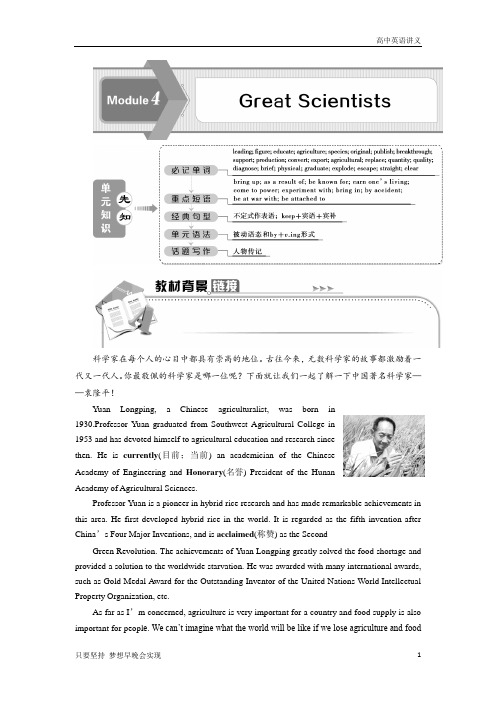
科学家在每个人的心目中都具有崇高的地位。
古往今来,无数科学家的故事都激励着一代又一代人。
你最敬佩的科学家是哪一位呢?下面就让我们一起了解一下中国著名科学家——袁隆平!Yuan Longping, a Chinese agriculturalist, was born in1930.Professor Yuan graduated from Southwest Agricultural College in1953 and has devoted himself to agricultural education and research sincethen. He is currently(目前;当前) an academician of the ChineseAcademy of Engineering and Honorary(名誉) President of the HunanAcademy of Agricultural Sciences.Professor Yuan is a pioneer in hybrid rice research and has made remarkable achievements in this area. He first developed hybrid rice in the world. It is regarded as the fifth invention after China’s Four Major Inventions, and is acclaimed(称赞) as the SecondGreen Revolution. The achievements of Yuan Longping greatly solved the food shortage and provided a solution to the worldwide starvation. He was awarded with many international awards, such as Gold Medal Award for the Outstanding Inventor of the United Nations World Intellectual Property Organization, etc.As far as I’m concerned, agriculture is very important for a country and food supply is also important for peopl e. We can’t imagine what the world will be like if we lose agriculture and foodsupply. But thanks to some great agriculturalists, many problems about agriculture and food supply are solved. And in this module we’ll learn about a famous agriculturalist—Yuan Longping.Section ⅠIntroduction & Reading and Vocabulary—Comprehending重点单词写作词汇1.leading adj.主要的2.figure n. 人物3.publish v t. 出版4.breakthrough__n.突破5.support__ v t. 支持6.replace__ v t. 取代;以……代替拓展词汇cate v t.教育→education n.教育→educator n.教育工作者;教师8.original adj.原来的;最初的→origin n.起源9.agriculture n.农业→agricultural adj.农业的10.production n.产量→produce v.生产→producer n.生产者11.export__ v t.出口→import v t.进口(反义词)12.quantity n.数量→quality n.质量阅读词汇13.biology n.生物学14.botany n. 植物学15.genetics n. 遗传学16.zoology n. 动物学17.staple adj. 主要的;重要的18.nickname n.绰号19.breeding n. 培育20.species n. (动物或植物的)种21.yield n. 产量22.convert v t. 改变;转换重点短语1.bring__up培养;养育2.as__a__result__of 由于……的结果3.the__key__to...……的关键4.bring__in 引入;挣得重点句型1.不定式作表语:He thought that the key to feeding people wasto__have__more__rice__and__to__produce__it__more__quickly(拥有更多的大米,并且能更快地生产出来).2.the way to do sth.做某事的方法:He thought there was only__one__way__to__do__this (做这件事的唯一方法)—by crossing different species of rice plant, and then he could produce a new plant which could give a higher yield than either of the original plants.ⅠRead the text and match the main idea of each paragraph.1.Para.1A.His discoveries have brought in great profit.2.Para.2 B.As a boy, he was called “the student who asks questions”.3.Para.3 C.Yuan Longping is a leading figure in the rice growing world.4.Para.4 D.The yield of the new hybrid rice is much greater than that of other types of rice grown in Pakistan.5.Para.5 E.As a young teacher, he began experiments in crop breeding.6.Para.6 F.He discovered a new type of rice.答案:1-6.CBEFADⅡRead the text carefully and choose the best answer according to the text.1.From the passage we know that Yuan Longping ________.A.got interested in plants in collegeB.studied in an agricultural school when he was a boyC.asked a lot of questions at school when he was a boyD.began experiments in crop breeding when he was a college student2.In Yuan’s opinion, the only way to produce more rice and to produce it more quickly was to ________.A.increase rice planting areasB.develop a new kind of fast growing riceC.search for a special type of rice plantD.develop a new kind of rice which can give a higher yield3.According to the text we can know that ________.A.rice is grown in most European countriesB.wheat is the most important crop in PakistanC.Yuan’s research was supported by himselfD.Yuan’s rice will be grown in more and more countries4.The last two paragraphs mainly talk about ________.A.the development of China’s agricultureB.Yuan Longping’s late lifeC.foreign countries’agricultureD.Yuan Longping’s contributions to China and the world答案:1-4.CDBDⅢAnalyze the following difficult sentences in the text.1.He thought that the key to feeding people was to have more rice and to produce it more quickly.that引导宾语从句,作thought的宾语。
外研版英语必修四 Module 4 Great Scientists 知识点课件28张
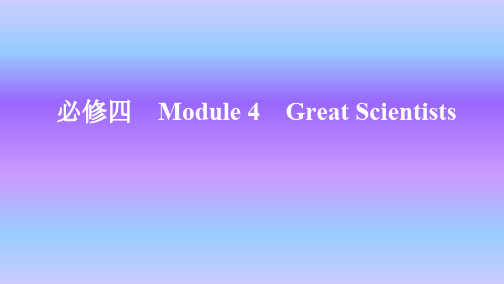
③Bob looked back only to find an old classmate whose name escaped (escape)him for the moment. ④The people in the Kiss Nightclub were trying to escape from the fire but were trapped by smoke. ⑤While he was crossing the street, he narrowly escaped being knocked (knock) down. ⑥The murderer ran away, trying to escape being caught (catch) by the police, but in vain.
3. escape v.逃跑;溜走;逃避;(指气体、液体等)漏出,被忘掉 n.逃跑 教材原句 ①The Chinese discovered that the gas escaping (escape) from the tube could lift it into the air. ◆单句填空 ②Fortunately, Natalie’s family escaped (escape) to Brooklyn shortly before the city’s bridges closed.
【点津】escape用作及物动词时,表示逃避或躲避不愉快的事(监禁、管
制、处罚等不幸或灾难),用作不及物动词时,则是指从监禁、管制或受
点拨 (1)support oneself 自力更生,自谋生机 support one’s family 养家糊口 support one’s opinion 支持某人的观点 (2)win/lose one’s support赢得/失去某人的支持 with sb.’s support有某人的资助 in support of支持
外研版必修4module-4-The-great-scientist

全国中小学“教学中的互联网搜索”优秀教学案例评选教案设计1. China produces more rice than any other country.2. Yuan Longping asked a lot of questions at school.Read paragraph 3-5 and finish the following form.about Yuan Longpingnicknamefrom an early ageas a teacher;do experiments in____________in 1966In 1970discovered a naturally______ ______rice plantin the 1990’s Chinese rice production ____________________; his ricewas ___________other countriesStep 4. Listen to the passage ,and finish the summary of the passage.百度搜索音频:&iid=&cid=25%China is the world’s largest rice _________. In the _____________ world, Yuan Longping is a leading ______. Yuan Longping was born and _______ ________ in China. As a school b oy, he was given the _________, “the student who asks questions”.He majored in____________ in college. He thought that the _______ to feeding people was to have more rice and to __________it more quickly. He thought there was only one way to do this—by _________ different species of rice plant, The results of his experiments ____ __________ in China in 1966. Then he began his search for a special type of rice plant, which must be _______ and_________. Finally, a naturally sterile male rice plant was discovered. This was the_____________. Researcher was _________ from all over china to develop the new system.step 5 language pointsthought that the key to feeding people was to have more rice and to produce it more quickly .他认为,解决人们吃饭问题的关键在于拥有更多的大米,并且能更快的生产出来。
外研版高中英语必修四 Module 4 Great Scientists课件

高中英语必修四Module 5 Great ScientistsSectionⅠIntroduction, reading and vocabulary一、语言•知识精讲1.Match the words and definitions.把单词和定义搭配起来match v.使较量,使比赛;比得;相配;使比较;使结婚Let beggars match with beggars.龙配龙,凤配凤。
Match your deeds to your beliefs.你应该使你的行动与你的信仰保持一致The king matched his daughter with the duke’s son.国王把女儿嫁给了公爵的儿子。
The carpets should match the wallpaper.地毯应该和墙纸相匹配。
Mary’s skirt matches her shoes.玛丽的裙子和鞋子很相配。
【相关链接】辨析:fit, match, suitfit与suit均指衣服“合适“或”适合“。
而fit指大小、尺寸合体,suit指颜色、花样或款式适合match多指大小、色调、形状、性质等方面的搭配。
The colour of the cloth suits a woman at my wife’s age.这布的颜色适合我妻子那个年龄的妇女That jacket fits well.那件夹克很合身The People’s Great Hall and the Historical Museum match the Tian’anmen magnificently.人民大会堂和历史博物馆把天安门映衬得极为宏伟。
例题1(1)None of us can him in playing tennis.A. matchB. beatC. defeatD. win(2)I guess no one ever up to him. I still think of him.A. wentB. matchedC. caughtD. measured(3)You should your products the market, which is the correct way to earn money.A. suit; toB. add up; toC. subject; toD. ask; to2.When did he discover it?他是什么时候发现它的?discover vi. & vt.发现,发觉discover后可接名词、代词、带疑问词的不定式或that/wh-从句作宾语,也可接以动词不定式、现在分词或“to be + n. / adj. / prep. phrase“充当补足语的复合宾语,可用于被动结构。
英语必修ⅳ外研版module4greatscientists教案
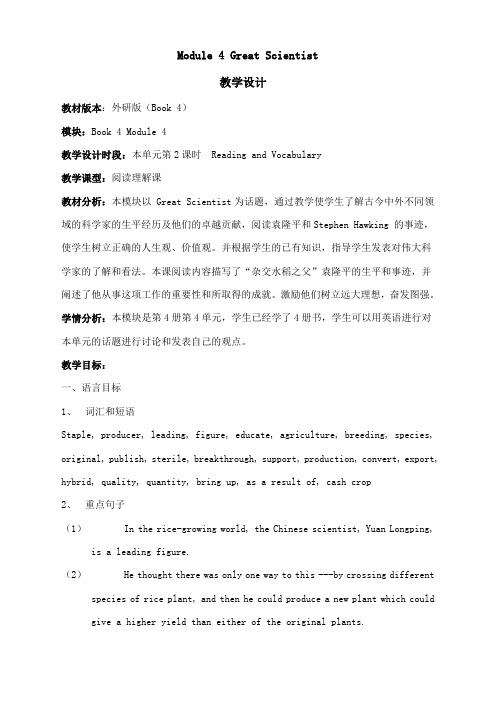
Module 4 Great Scientist教学设计教材版本:外研版(Book 4)模块:Book 4 Module 4教学设计时段:本单元第2课时 Reading and Vocabulary教学课型:阅读理解课教材分析:本模块以 Great Scientist为话题,通过教学使学生了解古今中外不同领域的科学家的生平经历及他们的卓越贡献,阅读袁隆平和Stephen Hawking 的事迹,使学生树立正确的人生观、价值观。
并根据学生的已有知识,指导学生发表对伟大科学家的了解和看法。
本课阅读内容描写了“杂交水稻之父”袁隆平的生平和事迹,并阐述了他从事这项工作的重要性和所取得的成就。
激励他们树立远大理想,奋发图强。
学情分析:本模块是第4册第4单元,学生已经学了4册书,学生可以用英语进行对本单元的话题进行讨论和发表自己的观点。
教学目标:一、语言目标1、词汇和短语Staple, producer, leading, figure, educate, agriculture, breeding, species, original, publish, sterile, breakthrough, support, production, convert, export, hybrid, quality, quantity, bring up, as a result of, cash crop2、重点句子(1)In the rice-growing world, the Chinese scientist, Yuan Longping, is a leading figure.(2)He thought there was only one way to this ---by crossing different species of rice plant, and then he could produce a new plant which could give a higher yield than either of the original plants.(3)As a result of Yuan Longping’s discoveries Chinese rice production rose by 47.5 perc ent in the 1990’s二、能力目标1、Enable students to talk about “the father of hybrid rice—Yuan Longping”2、Understand the text answer the related questions.3、Enable the students to understand the details about the passage, choosingthe correct answer according to the text and fill in the form about the passage.三、学能目标Help students learn how to talk about Yuan Longping and his achievements. 教学重点:1 Talk about “the father of hybrid rice---Yuan Longping”When and where was he born?Why was he famous?What did he discover?How important is the discovery?2 Discuss the question of comprehension:Why is Yuan Longping’s discovery very important?教学难点:1 Understand the importance of scientists’ achievements.2 Discuss the questions:What would you think of the new hybrid rice if you are a rice farmer? Explain why.Is the title of the passage suitable? If not, write a new one and give the reasons.3 Discuss what the students can learn from Yuan Longping.教学方法:1 Skimming and scanning2 Asking- and- answering activity in understanding the text.3 Discussion.Teaching procedures(教学过程):Step One Warming upShow the students some pictures of great scientists and ask them to talk about who they are and what achievements they had. Then show some pictures of Yuan Longping. Ask the students if they know something about him.(首先在屏幕上呈现一些著名科学家的图片,让学生讨论是否他们了解这些科学家,其目的是导入我国著名的科学家袁隆平这一话题)Step Two Reading1 ScanningGet the students to comprehend the passage quickly. Tell the students to look through the whole passage to get the general ideas of the passage. Encourage the students to express their different opinions in English. Then ask the students to look at the title of the passage. Ask the students if the title of the passage is suitable. If not, write a new one and give the reasons. Ask them to discuss with their partners.(这一环节目的是让学生快速阅读课文并了解文章大意,讨论文章的标题是否合适,可用什么标题来替换)2 Choose the best answer.(1)How could he manage to produce more ricequickly ?A.By crossing different species of rice plantB.By planting more riceC.By bringing in rice from other countriesD. By doing more experiments(2)The last two paragraphs mainly talk about___.A.China’s agriculture developmentB.Yuan Longping’s elderly lifeC.foreign countries’s agriculture revolutionD. Yuan Longping’s contributions to China and the world’s population (在屏幕上呈现以上的选择问题,检测学生是否了解文章大意)3 Find out the topic sentences.Para 1 Yuan Longping is a leading figure in the rice-growing world.Para 2 As a boy, he was called “the student who asked questions”.Para 3 As a young teacher, he began experiments in crop breeding.Para 4 He discovered a special type of rice.Para 5 His discoveries increased Chinese rice production.Para 6 The yield of the new hybrid rice is much greater than that of other types grown in Pakistan.(通过寻找The topic sentences的活动,让学生进一步的阅读和理解文章大意)4Read the passage again and judge the statements True of False.(1) China produces more rice than any other country.(2) Yuan Longping asked a lot of questions at school.(3) He developed a new kind of fast-growing rice.(4) The government helped him in his research.(5) The new rice replaced vegetables in 50 thousand square kilometers.(6) The new rice is now grown in other countries, such as Pakistan.(本环节目的是通过True or False questions 的练习使学生加深对课文的理解)5 Fill in the blank.Yuan Longping is a leading figure in the __________ world. As a boy, he was called “the student who asks question” . As a young teacher, he began _________ in crop ________. He thought that the ___ to feeding people was to have more rice and to produce it more quickly. In 1970 a naturally male rice plant was discovered. This was the ___________. As a result of this, Chinese rice production rose __47.5percent. The _____of the new rice is much greater than that of other types of rice grown in Pakistan.(这一项练习目的是帮助学生更好的了解袁隆平的生平与他的贡献,通过本项练习,指导学生如何进行课文的复述,这也是这一节课教学所要达到的能力目标之一。
高中英语 Module4 Great Scientists教案 外研版必修4-外研版高一必修4英语教

Module 4 Great ScientistsListening and C ultural cornerTeaching goals 教学目标1. Target language目标语言a. 重点词汇和短语award, radiation, be known for, quizb. 重点句子What round of the quiz is it?She and her husband were awarded the Nobel Prize in Physics in 1903.She died of cancer in 1934.2. Ability goals 能力目标Enable Ss to understand and get the information about the quiz.Enable Ss to know Madame Curie’s brief biography—her life and achievements. 3. Learning ability goals 学能目标Help Ss learn how to understand the key words to get the needed information. Teaching important points 教学重点Listen to the material about the quiz to grasp the key information to answer the given questions.Listen to the presentation about Madam Curie to get the needed information. Teaching difficult points教学难点Get the useful information needed by listening.Teaching methods教学方法a. Listening;b. Discussion;c. Cooperative learning;d. Group work.Teaching aids教具准备A recorder and a projector.Teaching procedures & ways教学过程与方式Step I RevisionCheck the homework.First, teacher shows the sentences on the screen and asks the Ss to translate them into English.Sa: English is used widely all over the world.Sb: The store was broken into yesterday.Sc: More factories will be built here.Sd: Much good farmland has been built on.Se: Only by working hard instantly, can you achieve your goal.Sf: We can improve oral English by practising every day.Step II Talking about the pictureTurn to Page 36, look at the picture, describing what is happening?POSSIBLE ANSWERS1: It seems that there is a quiz on the stage and the candidates are very nervous.Maybe it’s a close match.2: All of them are dressed very formally so I think it’s a serious contest and each of the two candidates presents a group.Step III ListeningFirst have the Ss listen to the tape, then ask the Ss to answer the questions. At last, get them to present the answers publicly to check them with the whole class. Play the tape once for the students to get the main idea of the material. The second time, the students are required to write down some key words of the answers, then ask some of them to present their answers. Play the tape for a third time to let them correct their answers and plete Part 3. Finally, ask the students to work in pairs, asking and answering the questions in Part 3 according to the listening material.Step IV Word studyPart 4 can be used as a little petition to see who is good at mastering the meanings of the words. Dividing the class into two parts. Teachers can read the definition out and each group are encouraged to spell the word with the book closed. The winner will be praised.Step V Cultural cornerNow let’s e to the other passage--- rockets. Answer the questions about the passage first.1. When and where were rockets invented?2. How were rockets invented?3. How were rockets used in the early stage?4. What are they used for today?Possible answers1: Rockets were probably invented by accident in China about 2,000 years ago. 2: Quite by accident. The idea of rockets came from the discovery that the gas escaping from the tube could lift into the air.3: The rockets were once used for military purposes. They were also used for fun in the past, though it was very dangerous.4: Today rockets can be used in many ways, such as to astronauts and spaceships into space, to set up fire-works and so on.Read the passage again to find out the topic sentences of each paragraph. Four minutes for them to read.Answer: The first sentence of each paragraph.Step VI ReadingPlay the tape for the students to listen and repeat.Step VII AssignmentToday we have listened to a passage about a quiz. You must learn to guess the possible information before listening and try to grasp the useful informationwhile listening. Stress is very important in both reading and listening.Retell the passage--rockets.Moduel 4Reading (I)毕付容Teaching goals 教学目标1. Target language目标语言a. 重点词汇和短语staple, producer, leading, figure, educate, agriculture, breeding, species, yield, original, publish, sterile, breakthrough, support, production, convert, export, hybrid, agricultural, replace, quality, quantity, bring up, as a result of, cash cropb. 重点句子1. In the rice-growing world, the Chinese scientist, Yuan Longping, is a leading figure. P322. He thought there was only one way to do this———by crossing different species of rice plant, and then he could produce a new plant which could give a higher yield than either of the original plants. P323. As a result of Yuan Longping’s discoveries Chinese rice production rose by 47.5 percent in the 1990’s. P322. Ability goals 能力目标a. Enable Ss to talk about “the father of hybrid rice—Yuan Longping”:When and where was he born?Why was he famous?What did he discover?How important is the discovery?b. Understand the text and answer the following questions:Why did Yuan Longping do the experiment in crops?What was the breakthrough in 1970?What are the advantages of the new hybrid rice?Where is the rice grown besides in China?c. Enable the Ss to understand the details about the passage, choosing the correct answer according to the text and fill in the form about the passage.3. Learning ability goals 学能目标Help Ss learn how to talk about Yuan Longping and his achievements.Teaching important points 教学重点a. Talk about “the father of hybrid rice—Yuan Longping”:When and where was he born?Why was he famous?What did he discover?How important is the discovery?b. Discuss the question of prehension:Why is Yuan Longping’s discovery very important?Teaching difficult points 教学难点a. Understand the importance of scientists’ achievements.b. Discuss the questions:What would you think of the new hybrid rice if you are a rice farmer? Explain why. Is the title of the passage suitable? If not, write a new one and give the reasons.c. Discuss what the students can learn from Yuan Longping.Teaching methods 教学方法a. Skimming and scanning;b. Asking-and-answering activity in understanding the text;c. Discussion.Teaching aids 教具准备A recorder, a puter, a projector.Teaching procedures & ways 教学过程与方式Step I Revision1Read after the tape to revise the words of this moduel.2Revise Introduction of this moduel.Step II Warming upT: Do you have a general idea about Yuan Longping?Ss: Yes, a little.T: Have you finished reading the text on Page 32Ss: Yes, of course.T: Now you have got a general idea about the great scientist —Yuan Longping. Today we are going to prehend the passage about him.Step III ReadingScanning1Read the text quickly and make students find the topic sentence of each paragragh ,match the two parts.Para1 A. His discoveries have brought in great profit.Para 2 B. As a boy, he was called “the student whoasked questions.Para3 C. Yuan Longping is a leading figure in therice – growing world.Para 4 D. The yield of the new hybrid rice is muchgreater than that of other types of ricegrown in Pakistan.Para 5 E. As a young teacher, he began experimentsin crop breeding.Para6 F. He discovered a new type of rice.2 Read the text one paragragh by paragragh and answer the questions.In this part Ss will read the text again and then work together with their partners to answer some questions that teachers show on the screen about the passage. Give them a few minutes to find out the answers and talk about them with their partners. Check the answers with the whole class.StepV Careful reading .1Read the passage and decide whether the statements are true (T) or false (F).1.China produces more rice than any other country.2.Yuan Longping asked a lot of questions at school.3. He developed a new kind of fast-growing rice.4. The government helped him in his research.5. The new rice replaced vegetables in 50 thousand square kilometres.6. The new rice is now grown in other countries, such as Pakistan.2Read the text carefully and plete the following chartStepVI Post readingAfter learning the text, fill in the blanksProfessor Yuan Longping is a leading figure in the ___________ world. He is famous for his great achievements in __________ and is well-known __ “th e Father of HybridRice”. After many years’ hard work, he produced a new plant by ________ different species of rice plant, _____ could give a higher _____ than either of the original plants. This breakthrough in rice breeding has made great ____________ to the world. Step Explaination1. As a boy he was educated in many schools and was given the nickname, “the student who asks questions”.= When he was a boy, Yuan Longping studied in many schools and was nicknamed “the student who asks questions”.本句为一个简单句。
高一英语Module 4 Great Scientists外研社知识精讲
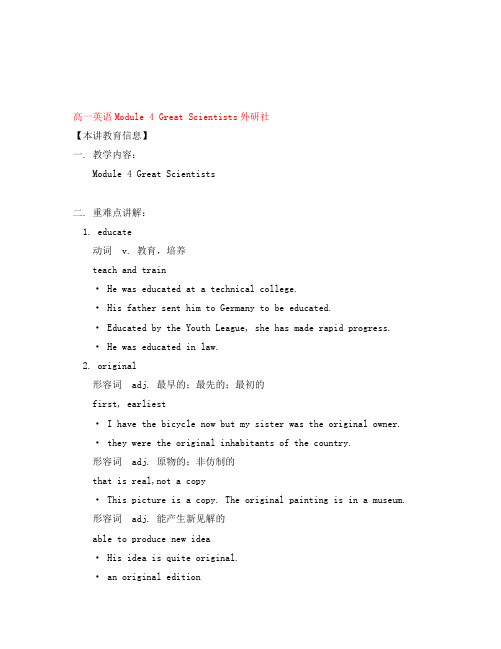
高一英语Module 4 Great Scientists外研社【本讲教育信息】一. 教学内容:Module 4 Great Scientists二. 重难点讲解:1. educate动词 v. 教育,培养teach and train· He was educated at a technical college.· His father sent him to Germany to be educated.· Educated by the Youth League, she has made rapid progress.· He was educated in law.2. original形容词 adj. 最早的;最先的;最初的first, earliest· I have the bicycle now but my sister was the original owner.· they were the original inhabitants of the country.形容词 adj. 原物的;非仿制的that is real,not a copy· This picture is a copy. The original painting is in a museum.形容词 adj. 能产生新见解的able to produce new idea· His idea is quite original.· an original edition名词 n. 原作;原版;原稿;原物thing of which there are copies· He can read Shakespeare in the original.· This is a good copy of the painting. The original is in the National Gallery.· The copy is every bit as good as the original.· after the original· read the book in the original· follow closely the original· mutilate the original· outshine the original3. support动词 v. 支持;支撑keep something or someone up; hold the weight of something· That small chair isn’t strong enough to support that heavy man.· This branch needs to be supported.· What is supporting the roof?· He was supporting himself with a stick.· Let me support you, take my arm.动词 v. 资助;维持help someone by giving money, etc.· Air, food and water are necessary to support life.动词 v. 供养;养活give food, clothes, and a home to someone· Mr. Donovan has to support a large family.· He has a wife and fifteen children to support.动词 v. 拥护;支持;帮助say that one thinks someone is best, right, etc. help· He decided not to support the new government.· He has always supported the weaker party.动词 v. 证明;证实serve to show (a statement, theory, etc.)to be true; give proof of; confirm· He told us facts which supported his argument.不可数名词 n.[U] 支持;拥护supporting someone or something; thing that gives support· We cheered to show support for our team.·He’s much stronger now; he can stand without support.· without support· give (some, any, not much, etc.)support (to)不可数名词 n.[U] 供养;生计means of maintenance· He’s the only support that his poor old mother has.· He does nothing for the support of his family.不可数名词 n.[U] 支持;后援;后盾backing influence· I hope to have your s upport.可数名词 n.[C] 支持者;支撑物;支柱;支座thing or person that supports· Put a support under it.· Take the supports away.4. convertv.转变,转换;使皈依宗教 n.改变信仰的人及物动词 vt. 改变,转换change; turn· Heat converts water into steam.· We converted defeat into victory.· This seat converts into a bed.· convert cotton into cloth· convert a bank note into gold· convert the sitting-room into a bedroom5. export动词 v. 输出,出口sell goods, etc. to another country· Many raw materials are exported to foreign countries.· Brazil exports coffee.可数名词 n.[C] 输出品,出口商品something that one country sells to another country· Both imports and exports continue to grow in volume.· Tea is an Indian export.不可数名词 n.[U] 出口,输出selling things to other countries· Spain grows oranges for export.· goods for export· allow the export of· prohibit(=stop) the export of· tax the exports6. replace及物动词 vt. 替换;取代;轮换put one thing in place of another thing· More new machines will be installed to replace the old ones.· Slowly each grain of wood was replaced with grains of minerals. · Lao Yang was elected to replace Lao Zhu in the committee.7. diagnose及物动词 vt. 诊断to discover the nature of (a disease)· The doctor diagnosed my illness as flu.8. escape动词 v. 逃跑,逃脱to get free from someone or something that is trying to hold one · The thief escaped by the backdoor.· The bird escaped from the cage.· They had no chance to escape.动词 v. 漏出,流出find a way out of a place· Water is escaping from the broken pipe.· The air is escaping somewhere.动词 v. 摆脱,躲避stay, keep, or get away from something that you do not like· He escaped being punished.· They escaped many difficulties.名词 n. 脱逃the act of escaping· There was no escape(from his enemies).· They had little hope of escape.名词 n. 漏(气、水)the escaping or flow of gas, water etc· There must be an escape of gas.三. 重难点词汇辨析:1. catch sb. doing sth; be (get) caught in sth.catch sb. doing sth.作“碰(遇)上某人正在做某事”解。
外研版必修4 module4 great scientists_教案教学资料
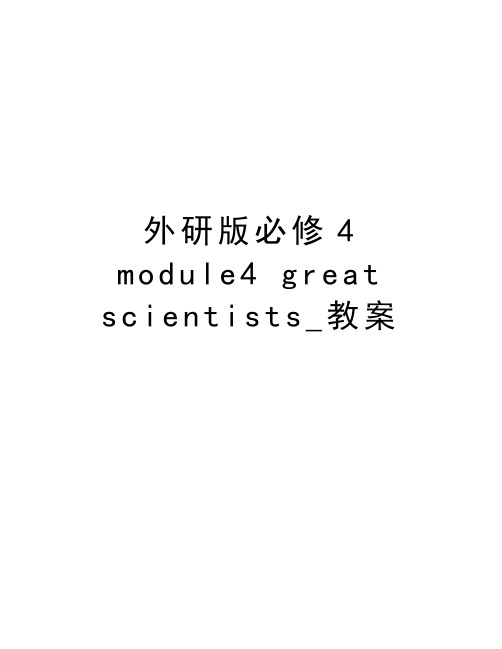
外研版必修4m o d u l e4g r e a t s c i e n t i s t s_教案Module 4 Great ScientistsTeaching Time: 教学时间Teaching Aims: 教学目标1. Knowledge and Skills 知识与技能a. Make students know some words, phrase and related expressions about scientists.b. Make students make a revision about the passive voice and the usage of “ by +- ing”.c. Make students learn to write an essay on great scientists’ life.d. Make students proficiently master how to say the numbers.e. Improve st udents’ abilities of listening, speaking, reading and writing.2. Process and Methods 过程与方法a. Improve students’ speaking ability through group discussion.b. Improve students’ analyzing and resolving abilities through group cooperation.3. Emotion and Values 情感与价值Make students know something about the current development of science and technology, as well as make them learn from those great scientists, such as the spirit of devoting to science, seeking truth and persistent dedication for human’s happiness and development.Teaching importance and difficulties:教学重点与难点1. Teaching Importance 教学重点a. Master some science-related vocabularies.b. Learn how to use passive voice.c. Learn how to say numbers.2. Teaching Difficulties 教学难点a. Make students understand some common expressions used in quiz show while listening.仅供学习与交流,如有侵权请联系网站删除谢谢2b. Enable students to use passive voice correctly.c. Enable students to write essays on great scientists’ life according to thestructure of the passage.Teaching Plan:教学计划Period One:Introduction, Reading and Vocabulary, FunctionPeriod Two: Grammar 1 and Grammar 2Period Three: Listening and Vocabulary, Pronunciation, Everyday English Period Four: Reading and WritingPeriod Five: Cultural Corner, Module FileReadingTeaching Goals:1.To know something about great scientists, such as Qian Xuesen, Marie Curie,Archimedes, Albert Einstein and Yuan Longping;2.To learn some science-related words;3.To learn how to say numbers.Teaching Procedures:Step 1: Lead in----- IntroductionBrainstorm:Question: What great scientists do you know? ( free speaking )Make students say something about those four great scientists--- Qian Xuesen,仅供学习与交流,如有侵权请联系网站删除谢谢3The answers:1. zoology2. botany3. biology4. physics5. biochemistry6. chemistry7. geneticsStep 2:Reading and Vocabulary1.From the title “The Student Who Asked Questions”, guess what the passage isabout?Who is the student?2. Make students find the topic sentence of each paragraph.Para1: Yuan Longping is a leading figure in the rice-growing world.Para2: As a boy, he was called “the student who asked questions”.Para3: As a young teacher, he began experiments in crop breeding.Para4: He discovered a special type of rice plant.Para5:His discoveries increased Chinese rice production.Para6:The yield of the new hybrid rice is much greater than that of other types grown in Pakistan.3. Make students skim the passage and find the answers to the following questions.1)What kind of student was Yuan Longping when he was young?2)What way did he think to produce rice more quickly?3)What did he discover?4)How important was the discovery?The possible answers:仅供学习与交流,如有侵权请联系网站删除谢谢41)He was a student with lots of questions and he was interested in plants.2)By crossing different species of rice plant, then he could produce a new plant which could give a higher yield than either of the original plants.3)He discovered a naturally sterile male rice plant.4)Chinese rice production rose by 47.5% in the 1990’s.There were other advantages.●50,000 square kilometers of rice fields were converted to growing vegetablesand other cash crops.●Yuan’s rice was exported to other countries.●His rice’s yield is much greater than the yield of other types of rice grown inPakistan.4.Make students read the passage carefully and decide whether the statement are true or false.1). China produces more rice than any other country.2). Yuan Longping asked a lot of questions at school.3). He developed a new kind of fast-growing rice.4). The government helped him in his research.5). The new rice replaced vegetables in 50 thousand square kilometers.6). The new rice is now grown n other countries, such as Pakistan.The answers: TTTTFT5. Make students finish exercises in activity 3 and 4 on page 33 individually,then check the answers.Step 3: Language points1.He thought that (the key to feeding people was to have more rice and toproduce it more quickly.) 宾语从句2.He though there was only one way to do this---by crossing different speciesof rice plant, and then he could produce a new plant which could give ahigher yield than either of the original plants.3.First Yuan Longping experimented with different types of rice.experiment: (V.)做实验4. This was the breakthrough.5. 50 kilometres of rice fields were converted to growing vegetables and othercash crops.仅供学习与交流,如有侵权请联系网站删除谢谢56. Following this, Yuan Longping’s rice was exported to other countries, such as ….Step 4: Function1. Make a revision about how to say numbers in English.Integral number整数 fractional number 分数 decimal number 小数 percentage 百分数3.Make students finish exercises in activity 1 and 2 on page 35.Step5: Homework1.Make students preview grammar 1 and 22.Finish exercise 5 to 12 on page 86 . (vocabulary and reading仅供学习与交流,如有侵权请联系网站删除谢谢6。
外研版英语必修4 Module4 Great Scientists--Reading

Module 4 Great ScientistsPart One Teaching DesignPeriod 1Reading—The Student Who Asked Questions■Goals●To learn to read passages with the passive voice andby+-ing about great scientists●To learn to read with strategies■ProceduresStep 1: Warming up by defining sciencesBiochemistry: A branch of chemistry studying the chemicalbehavior in living beings. Biochemistry is not onlyinterested in the individual chemical ponents but also their vital interplay.Biology: the science that deals with living things. It is broadly divided into zoology, the study of animal life, and botany, the study of plant life. Subdivisions of each of these sciences include cytology (the study of cells), histology (the study of tissues), anatomy or morphology, physiology, and embryology (the study of the embryonic development of an individual animal or plant). Also included in biological studies are the sciences of genetics, evolution, paleontology, and taxonomy or systematic, the study of classification.Botany: the scientific study of plant life. As a branch of biology, it is also sometimes referred to as plant science(s) or plant biology. Botany covers a wide range of scientific disciplines that study the growth, reproduction, metabolism, development, diseases, and evolution of plants.Genetics: scientific study of the mechanism of heredity. While Gregor Mendel first presented his findings on the statistical laws governing the transmission of certain traits from generation to generation in 1856, it was not until the discovery and detailed study of the chromosome and the gene in the 20th cent that scientists found the physical basis of hereditary characteristics. Zoology: The original branches of zoology established in the late 19th century such as zoo-physics, bionomics have largely been subsumed into more broad areas of biology which include studies of mechanisms mon to both plants and animals.Chemistry: the science of matter and its interactions with energy and itself (see physics, biology). Because of the diversity of matter, which is mostly in the form of atoms, chemists often study how atoms interact to form molecules and how molecules(分子) interact with each other.Physics: the science of Nature in the broadest sense. Physicists study the behavior and properties of matter in a wide variety of contexts, ranging from the sub-nuclear particles from which all ordinary matter is made (particle physics) to the behavior of the material Universe as a whole (cosmology宇宙论).Step 2: Before you readPlease go over the word list for this module, paying attention to the pronunciation of the word, the relationship between its pronunciation and its spelling.Step 3: While you read3. plete the article with one word in each blankThe Chinese scientist, Yuan Longping, is a _1_ figure in the rice-growing world. When he was educated in school he was given the _2_ , “the student who asks questions〞. From an early age he was so interested in plants that he _3_agriculture in college. As a young teacher he began experimenting in crop breeding. First Yuan Longping _4_ with different types of rice. The results became known in China in 1966. Then he _5_ his search for a special type of rice plant. It had to be male. It had to be sterile. Finally, in 1970 a_6_sterile male rice plant was discovered. This was the breakthrough. As a _7 _of Yuan Longping’s discoveries Chinese rice production rose by 47.5 percent in the 1990’s. There were other _8_, too. 50 thousand square kilometers of rice fields were converted to growing _9_and other cash crops. Fol lowing this, Yuan Longping’s rice was exported4. Answer the reading prehension questions according to the text1. What does “staple〞mean in “In a hungry world rice is a staple food and China is the world’s largest producer〞?A. chief or prominent among the products exported or produced by a country or district; chiefly or largely dealt in or consumed.B. basic, chief, or principal: staple industries.C. principally used: staple subjects of conversation.D. important and outstanding2. He studied agriculture in college and as a young teacher he began experiments in _____.A. crop breedingB. feeding peopleC. sterile male riceD. with different types of rice3. He thought that the key to have more rice was by _____.A. experimenting with different types of riceB. asking questionsC. crossing different species of rice plantD. searching for a special type of rice plant4. Finally, in 1970 a _____ was discovered. This was the breakthrough.A. staple foodB. new plant which could give a higher yieldYou are going to read the text again and draw a diagram of it. You may use the diagram to retell the。
外研高中英语必修 4教案Module 4 Great Scientists教案
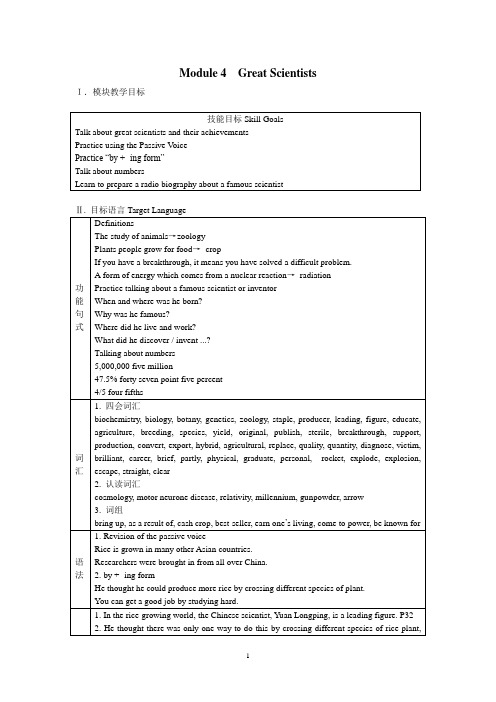
Module 4 Great Scientists I.模块教学目标III. 教材分析与教材重组1. 教材分析本模块以Great Scientists为话题,旨在通过模块教学使学生通过了解古今中外不同领域的科学家的生平经历以及他们的卓越贡献,阅读袁隆平和Stephen Hawking的事迹,使学生树立正确的人生观、价值观。
并根据学生的已有知识,指导学生发表对伟大科学家的了解和看法,通过进一步讨论使学生树立为了全人类的发展而努力的远大理想。
能根据关键词写出伟大科学家的事迹,并能够准备出一位著名科学家的传记。
1.1 INTRODUCTION以四幅著名科学家的肖像画引导学生就本模块话题展开讨论,通过学生的讨论,激发学生对本模块的中心话题产生兴趣;但第一、三幅,特别是第三幅人物肖像辨认难度较大,老师可引导学生从二、四幅开始由易到难讨论,必要时可给出人物的相关信息让学生依据获取信息去判断,推测。
V ocabulary是根据英文释意在语境中掌握和运用词汇、术语。
1.2 READING AND VOCABULARY 此部分描写了“杂交水稻之父”袁隆平的生平和主要事迹,并阐述了他从事这项工作的重要性和所取得的成就:缓解了中国在内的很多国家的饥饿问题,培育出了高产、周期短等优点的杂交水稻,是人类农业史上非常有意义的重大突破。
使学生通过阅读学习逐步领悟到:通过个人的不懈努力、在政府和同事的帮助下是完全有可能为全社会和整个人类的发展做出伟大贡献的。
从而激励他们树立远大理想,从我做起,从今天做起,奋发图强。
但阅读后面的相关理解题太少且深度不够,应根据学生水平适当补充。
1.3 GRAMMAR 1: Revision of the passive voice让学生依据例子判断、归纳每句被动语态的时态,从而注意时态和语态的结合。
然后以连词成句和完成句子的形式反复操练,以达到熟能生巧的效果。
Exx. 1&2 on P85是相关练习。
外研版 高一 必修四 Module4 Great scientist说课稿讲课教案
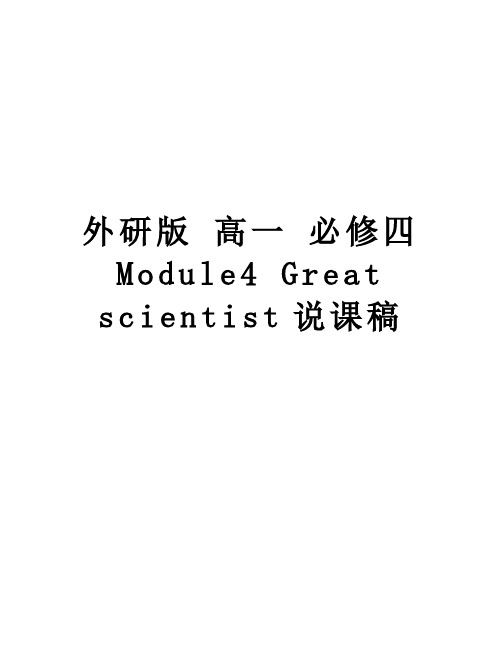
外研版高一必修四M o d u l e4G r e a ts c i e n t i s t说课稿Module 4 Great ScientistsPeriod 1 Reading and Vocabulary& SpeakingModule 4 Great ScientistsPeriod 1 Reading and Vocabulary& Speaking——说课稿一、说教材(一)教材内容及分析我说课的内容是外研版《英语》(新标准)高中第四册(必修四)Module4 Great Scientists的Reading and Vocabulary的短文阅读以及Speaking 的口语训练。
本模块以Great Scientists为话题,介绍了中国杂交水稻之父——袁隆平的故事,旨在通过本模块的教__________________________________________ ________学使学生描述科学家及其生平,并能运用所学词汇、句型来表达一个完整的记叙题材故事,从而培养其语言表达以及写作能力。
Introduction部分主要介绍了四位伟大的科学家,并通过讨论形式了解相关词汇;Reading and Vocabulary 部分要求学生利用所学词汇阅读短文,了解袁隆平生平。
训练学生速读、精读的能力。
(二)教学目标根据《新课标》总目标描述,结合本课内容,我把本节课的教学目标系统化,分别是:语言知识、能力目标、情感目标、文化意识,和学习策略。
1. 语言知识目标掌握并能运用下列词汇:__________________________________________ ________Rice-growing world, a leading figure, the key to, cross, yield, be converted to, the new hybrid rice, cash crop…2. 语言技能目标运用本节课所学词汇,理解短文,了解袁隆平的个人经历,获取信息和理解作者意图;简单描述某一科学家生平。
高中英语外研版必修四教师用书Module 4 Great Scientists
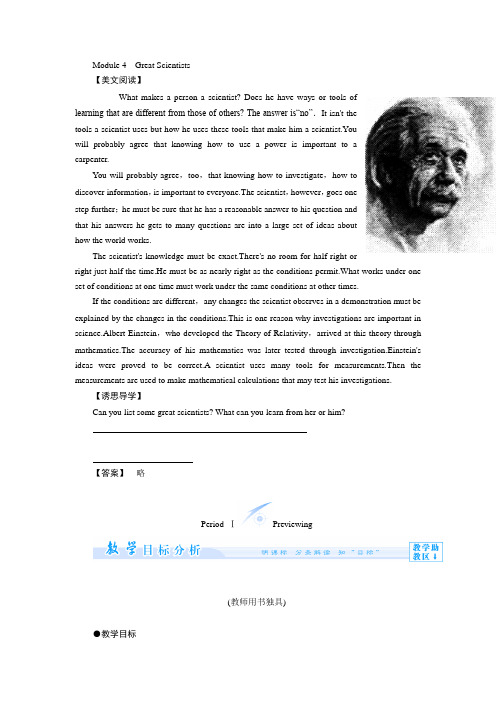
Module 4Great Scientists【美文阅读】What makes a person a scientist? Does he have ways or tools oflearning that are different from those of others? The answer is“no”.It isn't thetools a scientist uses but how he uses these tools that make him a scientist.Youwill probably agree that knowing how to use a power is important to acarpenter.You will probably agree,too,that knowing how to investigate,how todiscover information,is important to everyone.The scientist,however,goes onestep further;he must be sure that he has a reasonable answer to his question andthat his answers he gets to many questions are into a large set of ideas abouthow the world works.The scientist's knowledge must be exact.There's no room for half right orright just half the time.He must be as nearly right as the conditions permit.What works under one set of conditions at one time must work under the same conditions at other times.If the conditions are different,any changes the scientist observes in a demonstration must be explained by the changes in the conditions.This is one reason why investigations are important in science.Albert Einstein,who developed the Theory of Relativity,arrived at this theory through mathematics.The accuracy of his mathematics was later tested through investigation.Einstein's ideas were proved to be correct.A scientist uses many tools for measurements.Then the measurements are used to make mathematical calculations that may test his investigations.【诱思导学】Can you list some great scientists? What can you learn from her or him?【答案】略Period ⅠPreviewing(教师用书独具)●教学目标本课时主要是通过学生对学案所给出的内容的学习,了解本课文中所出现的词汇,初步了解课文以及相关的背景知识,对下一堂课对课文的全面理解起到一个铺垫作用。
新高考外研英语必修4Module 4Great Scientists课件

Ⅱ.根据提示补全句子 1.保护环境的关键是让人们意识到环境的重要性。 (the key to) _T__h_e_k_e_y__t_o__p_ro_t_e_c_ti_n_g__th_e__e_n_v_ir_o_n_m__en_t____ is to let people realize the importance of environment. 2.孩子们被要求保持教室干净整洁。(keep+宾语+宾补) Children are requested to __k_e_e_p__th_e__c_l_as_s_r_o_o_m__c_le_a_n__a_n_d__ti_d_y___. 3.我知道以前听过这首歌,但我想不起歌名了。(escape) I know I've heard this song before but its name_e_sc_a_p_e_s_m__e_/m__y_m__em__o_r_y.
“This is a collaborative(合作的)effort that anyone could get involved in,”says Chris Lintott,an Oxford University astrophysicist(天体物理学 家)and co-founder of Zooniverse,a platform that hosts dozens of citizen science projects.Citizen scientists can contribute to breakthroughs in almost any field,from ecology to astrophysics.
many countries across the world.
- 1、下载文档前请自行甄别文档内容的完整性,平台不提供额外的编辑、内容补充、找答案等附加服务。
- 2、"仅部分预览"的文档,不可在线预览部分如存在完整性等问题,可反馈申请退款(可完整预览的文档不适用该条件!)。
- 3、如文档侵犯您的权益,请联系客服反馈,我们会尽快为您处理(人工客服工作时间:9:00-18:30)。
Module 4 Great ScientistsPeriod One:Introduction, Reading and VocabularyTeaching Goals1. Language goalsa. Make students know some words, phrase and related expressions about scientists.b. Make students learn to write an essay on great scientists’ life.c. Make students proficiently master how to say the numbers.d. Improve students’ abilities of listening, speaking, reading2.Ability goalsa. Improve students’ speaking ability through group discussion.b. Improve students’ analyzing and resolving abilities through group cooperation.3. Emotional abilitiesMake students know something about the current development of science and technology, as well as make them learn from those great scientists, such as the spirit of devoting to science, seeking truth and persistent dedication for human’s happiness and development. Teaching importance and difficulties:1. Teaching Importancea. Master some science-related vocabularies.b. Learn how to use passive voice.c. Learn how to say numbers.e.Improve the students’reading ability.f.Enable the students to understand the text better.3. Cultivated the students’cultural awareness.2. Teaching Difficultiesa. Make students understand some common expressions used in quiz show while listening.b. Working together to find out the main idea of each paragraph.c. Enable students to write essays on great scientists’ life according to the structure of thepassage.d. The ability to guess the new words in a passage.Teaching Methods1. Fast reading to get the general idea of the text.2. Careful reading to answer some detailed questions.3. Individual, pair or group work to make every student work in class.Teaching Aids1.Powerpoint2.BlackboardTeaching Procedures:Step 1: Lead in----- IntroductionBrainstorm:Question: What great scientists do you know? ( free speaking )Make students say something about those four great scientists--- Qian Xuesen, Marie Curie,Introduction-2. VocabularyFind out the words with their definitions.1. t he study of animals zoology2. the study of plants botany3. the study of all living things biology4. the study of physical objects and natural forces physics5. the study of chemical processes in living things biochemistry6. the study of the structure of substance and how they react with each other chemistry7. the study of inherited characteristics in living things geneticsIntroduction-2. VocabularyStep 2:Reading and VocabularyNew words:Match the words in the box with the definitions.agriculture breakthrough breed crop feed producer publish species support1.plants people grow for food crop2.a very important discovery breakthrough3.to produce new plants or animals breed4.to give up support5.to give food to feed6.to make information known, for example, in a report or a book publish7.someone who makes things or grows food producer8.a type of plant or animal species9.the science of farming agriculture Reading & Vocabulary-1. Pre-readingLook at the title and guess what it is about.1. From the title “The Student Who Asked Questions”, guess what the passage is about?Who is the student?2. Do you think that the writer wrote about how the student studied in school? Did the writer write about what he did when he grew up? Why?Reading & Vocabulary-1. ScanningRead the passage and find out the topic sentence of each paragraph.topic sentences.Part 1: Y uan Longping is a leading figure in the rice-growing world.Part 2: As a boy, he was called “the student who asked questions”.Part 3: As a young teacher, he began experiments in crop breeding.Part 4: He discovered a special type of rice.Part 5: His discoveries increased Chinese rice production.Part 6: The yield of the new hybrid rice is much greater than that ofother types grown in Pakistan.Reading & Vocabulary - 3. Careful reading 1.Read the passage and find out the answers to the questions.1. What kind of student was Yuan Longping when he was young?2. What way did he think to produce rice more quickly?3. What did he discover?4. How important was the discovery?Reading & Vocabulary - 3. Careful reading 2.Read the passage again and decide whether the statements are True of False.1. China produces more rice than any other country.2. Yuan Longping asked a lot of questions at school.3. He developed a new kind of fast-growing rice.4 .The government helped him in his research.5. The new rice replaced vegetables in 50 thousand square kilometers.6. The new rice is now grown n other countries, such as Pakistan.Reading & Vocabulary -3. VocabularyFinish the exercises in Activity 3 & 4.Activity 4:1) B2) B3) A4) B5) BPost-reading-4. Role-playSuppose one of you is an experienced farmer who has been growing rice; One is professor Y uan and the other one is a reporter. Please talk about the influence of the new hybrid rice.Tips:Figures In the past Nowadays In the futureThe farmerProf. Y uanHomework:Try to find some information about the influence of the hybrid rice. Then share it with the classmates tomorrow.。
